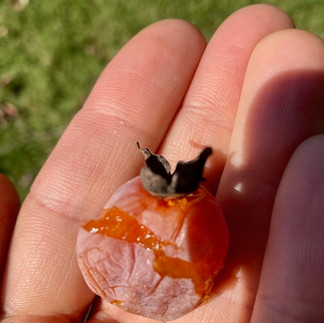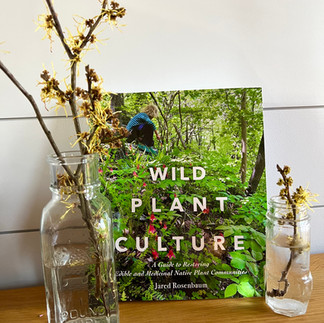
Jared Rosenbaum is a botanist and Certified Ecological Restoration Practitioner with extensive experience in stewardship and monitoring of natural communities. Co-owner with his wife Rachel Mackow of Wild Ridge Plants in Alpha, New Jersey, he is the author of two books on native plants, including Wild Plant Culture: A Guide to Restoring Native Edible and Medicinal Plant Communities, and the children’s book The Puddle Garden. He is also the face and voice behind the Wild Plant Culture Podcast, and, along with documentary filmmaker Jared Flesher, Jared Rosenbaum is the host of the Rooted Series of Wild Plant videos.
"Wild Ridge Plants is situated in in Alpha (Pohatcong Township), New Jersey where Warren County’s rolling farmland meets the rugged ridges of the Highlands. the Musconetcong River, and the Delaware River. " There, Rachel and Jared combine their experience in restoration, stewardship, and botany with their "passion for reconnecting people with the traditional uses of wild plants." Their engagement in nature is informed by their “shared interest in the arts and human culture. In addition to plants, music is a bridge between all of their interests. Together, Rachel and Jared play dark rock n’ roll in the band Hollow Howl, as well as being immersed in photography, writing, printmaking, and fiber arts.
"It’s interesting that Nature has become a subset of Science , because Nature [is in fact] everything. Animals are not 'biology,' they’re not a high school subject, and plants aren’t 'botany'. And certainly ecology and the natural world transgress the bounds of what we think of as ‘science’ very readily."
-Jared Rosenbaum
The wilds of New Jersey might sound like a humorous oxymoron to many – many who don’t live in New Jersey. And humor is one of our Jared's great traits, along with his deep love of the plants and places making up New Jersey and its wilds – whether scrappy and unlikely roadside verges or extant majestic old-growth forests.
In our conversation, Jared shares the germination story for his book Wild Plant Culture, which sees prior human land use and care going back 100 years or 10,000 years as important in the shaping of current land use and care as natural processes of evolution and adaptation. He believes that something he calls ecoculture - investing a sense of sanctity to all places and lives - restores so much more than just plants or plant communities.
Jared also describes the process for becoming certified as an ecological restoration practitioner, as well as sharing how his most underemployed moment was also the exact time in life that allowed him to learn most intensively from the place and plants around him.
Jared has an abiding curiosity about the intersection of ecology and culture. From his deeply rooted place there in New Jersey, I am so pleased to welcome Jared to Cultivating Place this week.
Follow Jared's work online:
And on Instagram:
And on Facebook:
All photos courtesy of Jared Rosenbaum, Wild Ridge Plants. All rights reserved.
If you enjoyed this program, you might also enjoy these
Best of CP programs in our archive:
JOIN US again next week, when guest host Abra Lee will be joined in conversation by Reverend Jerri Mitchell-Lee, great-niece of Harlem Renaissance Poet and gardener, Effie Lee Newsome–whose poetry and philosophy was the inspiration behind and showcased in an award-winning Philadelphia Flower Show garden conceived by Landscape Architecture students of Auburn University. That's right here, next week.
Cultivating Place is made possible in part by listeners like you and by generous support from
supporting initiatives that empower women and help preserve the planet through the intersection of environmental advocacy, social justice, and creativity.
Thinking out loud this week...
Here’s the sentence that got me in the first segment of our conversation with Jared of Wild Plant Culture–
“I was a city kid plunked down in a little cabin with a 1000 acres of woods around us and I was like Ohhhhh this is the planet I grew up on! And I had no idea.”
How many of us are actually unaware–even us as gardeners–of the vastness and enormous generosity of this planet we were lucky enough to be plunked down on?
It is a miracle of magnitude that I fear is often beyond us, and yet – as the extent to which the plants were Jared’s first and best teachers on his path to becoming a botanist, a certified ecological restoration practitioner, and teacher himself–the important thing is we can always learn more starting right now–starting right where we are with the plants of our place.
So much still to learn is a revelation and celebration all its own.
Later in the conversation, I'm struck by something Jared notes as almost an aside–this one regarding the nursery’s work with home gardeners, around “including native plants in what sometimes are ultimately are land restorations at the scale of a backyard.”
As we know from our friend Dr. Doug Tallamy and his communal work under Homegrown National Park, land restoration at the scale of a backyard is a primary location of land restoration at a continental and planetary scale.
Let’s never forget how much every home garden matters and every home gardener. We have the agency to grow so much positive change.
WAYS TO SUPPORT CULTIVATING PLACE
Cultivating Place is a co-production of North State Public Radio, a service of Cap Radio, licensed to Chico State Enterprises. Cultivating place is made possible in part listeners just like you through the support button at the top right-hand corner of every page at Cultivating Place.com.
The CP team includes producer and engineer Matt Fidler, with weekly tech and web support from Angel Huracha, and this summer we're joined by communications intern Sheila Stern. We’re based on the traditional and present homelands of the Mechoopda Indian Tribe of the Chico Rancheria. Original theme music is by Ma Muse, accompanied by Joe Craven and Sam Bevan.
SHARE the podcast with friends: If you enjoy these conversations about these things we love and which connect us, please share them forward with others. Thank you in advance!
RATE the podcast on iTunes: Or wherever you get your podcast feed: Please submit a ranking and a review of the program on Itunes! To do so follow this link: iTunes Review and Rate (once there, click View In Itunes and go to Ratings and Reviews)
DONATE: Cultivating Place is a listener-supported co-production of North State Public Radio. To make your listener contribution – please click the donate button below. Thank you in advance for your help making these valuable conversations grow.
Or, make checks payable to: North State Public Radio - with Cultivating Place in subject line
and mail to: Cultivating Place
PO Box 37
Durham, CA 95938































Comments